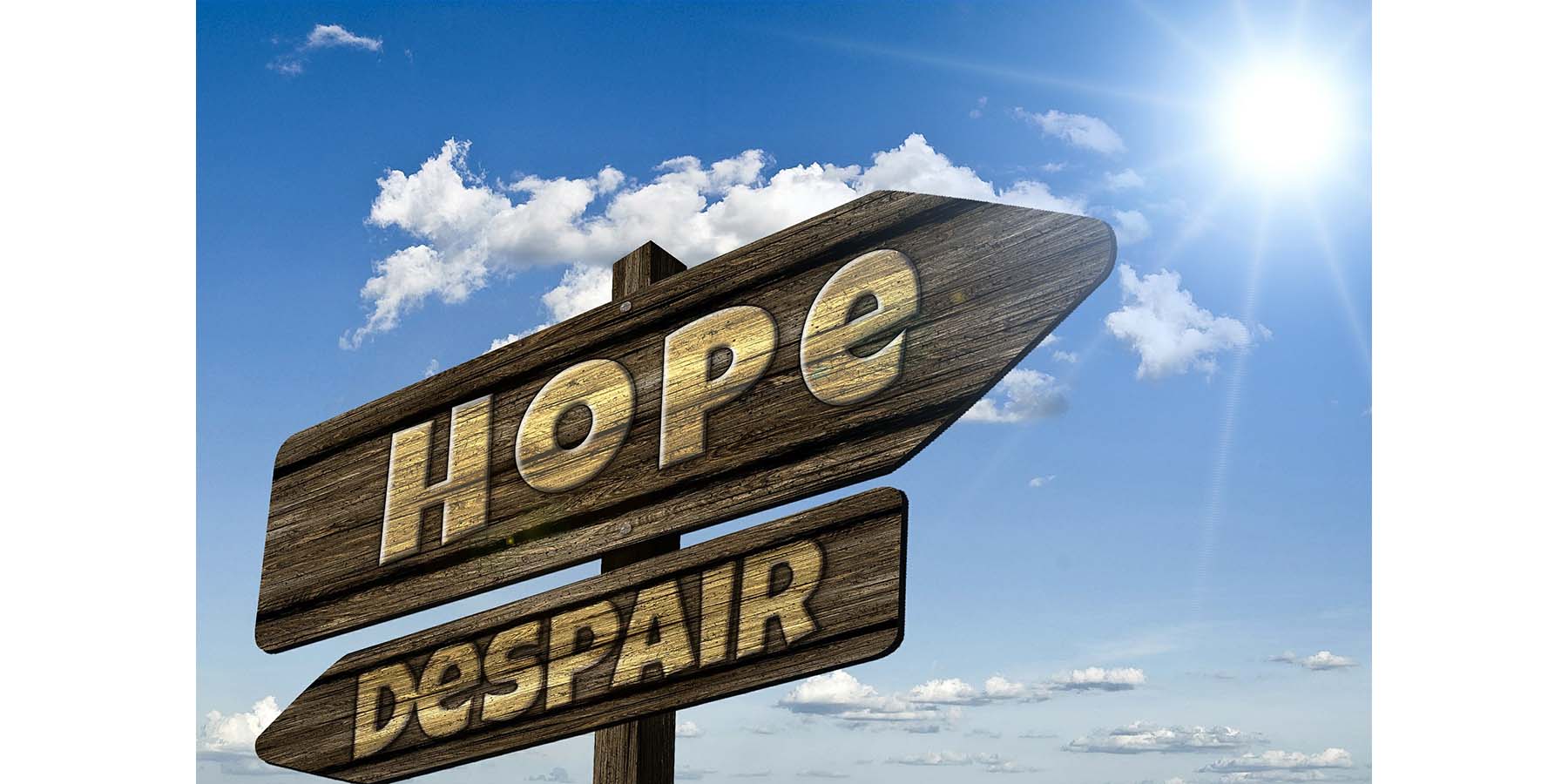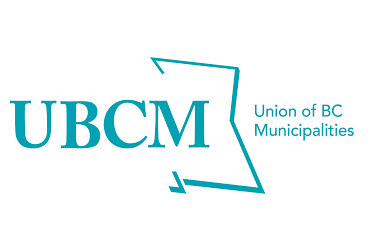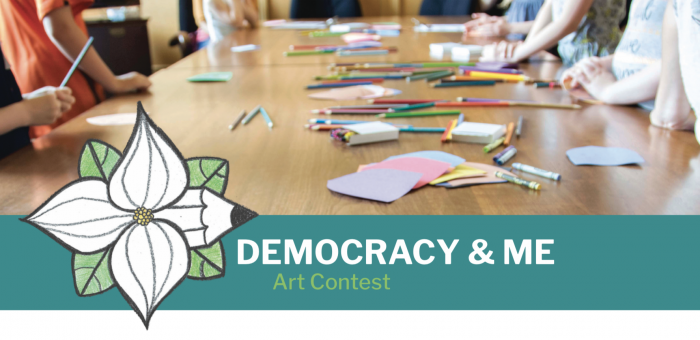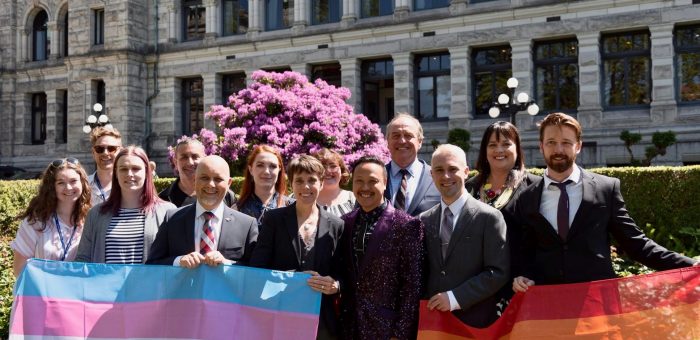Community Blog
Celebrating Connections Place on World Mental Health Day
Today in the legislature I had the pleasure of introducing Jackie Powell along with Sister Patricia Donovan, Sister Judi Morin, Cherry Lynn Brown, Bruce Sanders, Joe Devison, Naomi Beck, Owen Jones, Mike Mori, Tula Rivera, Peter Fitzpatrick and Sonia Garza, who have been instrumental in setting up Connections Place. As noted on their website:
“Connections Place is a Greater Victoria, BC-based community that helps people with mental illness achieve self-reliance, and use their skills and talents to get their lives back on track.“
I first met Jackie Powell in 2014 when she came to me as a constituent with a vision. She wanted to realize a goal of providing a day program for people with mental health challenges. I was incredibly impressed with her presentation on the need for a program modelled on the Clubhouse International program. Jackie has persevered and built support for her initiative and kept me informed of her progress for the last five years.
Connections Place opened up its doors in March of 2019 and now has about 100 members, with more coming onboard every week. I’m absolutely thrilled to see her vision become a reality today.
Below I reproduce the video and text of the Statement I gave celebrating the importance of Connections Place in our community.
Video of Statement
Text of Statement
Today is World Mental Health Day. There are many individuals and organizations doing incredible work in this field across our beautiful province. But today I want to speak about just one that I had the pleasure of visiting this past summer. Connections Place is a recently opened Clubhouse International in the greater Victoria area. The Clubhouse model is an evidence-based model of psychosocial rehabilitation for people who are struggling with a mental illness.
Isolation is a major factor in mental illness, and a clubhouse gives a people a reason to wake up in the morning, a place to come to, to have a purpose, to be welcomed, needed and wanted, to be part of a community of caring people. I witnessed that firsthand and put behind those words my experience to say that they are exactly as I read. A small group of trained staff work alongside members to guide them to full social inclusion.
Connections Place is not alone in B.C. Their mentor clubhouse, Pathways in Richmond, has been operating for over 30 years successfully and helping the lives of many. It’s been named as one of Canada’s top 10 impact charities. This is clearly a model that works.
One in four people struggle with a mental illness in the greater Victoria area. That’s about 95,000 people. Almost a quarter of that number will have a serious and permanent mental illness — almost 25,000 people — which can cut life expectancy by up to 20 years. Families, employers and emergency services are all impacted.
Connections Place opened up its doors in March of 2019 and now has about 100 members, with more coming onboard every week. I welcome the addition of Connections Place to our community. This was Jackie Powell’s vision when I first met her in 2014. I’m absolutely thrilled to see her vision become a reality today.
Speech to delegates at the 116 th Union of BC Municipalities Convention
Today I was afforded the opportunity to present to delegates at the 116th Union of BC Municipalities Convention in Vancouver. Below I reproduce the complete text (with links) of this speech.
Text of Speech
It’s a great honour for me to be able to once more address you, the delegates to the UBCM.
You know, two weeks ago, and just 15 minutes before I was supposed to give a keynote at the Canadian Propane Association BC Seminar in Langley, I was hit with acute vestibular neuritis which put me in hospital for 5 days.
The irony is not lost on me…but you can imagine how grateful I am to be up and on stage here today.
While I am expected to make a complete recovery in a few weeks, I had to limit my activities which meant that my scheduled meetings with local government representatives this week were all cancelled. For that I sincerely apologize.
In the audience today there are many politicians.
Some of you lean left.
Some of you lean right.
In my case, the vestibular neuritis has left me tilting right and left on a second by second basis but I look forward to stabilizing somewhere in the middle shortly.
The one silver lining in all of this is my incapacitation couldn’t have come at a better time… right at the start of the 2019 Rugby World Cup!
————
There’s a lot of new faces in the crowd this year so for those of you who don’t already know my background I’d like to add that prior to joining the legislature in 2013 as the lone BC Green MLA, I was the Lansdowne Professor and Canada Research Chair in Climate Modelling and Analysis at the University of Victoria.
I served as a Lead Author in the last four United Nations Intergovernmental Panel on Climate Change Assessment reports.
I ran for election in 2013 as I could no longer watch what was happening to our province from the sidelines.
I ran as a point of principle, never actually expecting to get elected (after all no Green Party politician anywhere in Canada had ever before been elected at the provincial level).
I ran on a platform of evidence-based decision-making to counter the decision-based evidence-making rhetoric espoused by so many of our political leaders.
I ran on a platform of ensuring that we focus on the long-term consequences of our decisions instead of solely being fixated on what it would take to get reelected.
I ran to offer British Columbians a vision of social, economic and environmental prosperity grounded in the incredible opportunity afforded us by the challenge of global warming.
And here we are today, two years after the 2017 election delivered a minority government with my two BC Green Caucus colleagues and I holding the balance of responsibility. It’s been a remarkable journey.
Keeping with this year’s theme of ‘resilience and change’, I want to speak to you both as a climate scientist and as a political leader.
In doing so I hope to convince you that each and every challenge our province faces needs to be embraced and thought of as an incredible opportunity for innovation.
And innovation is the foundation of any modern economy.
First, the science.
Since we met last year, a number of sobering reports have been released:
The first was the 2018 IPCC special report in which the world’s leading climate scientists warned there are only a dozen years for global warming to be kept to a maximum of 1.5°C, beyond which even half a degree will significantly worsen the risks of drought, floods, extreme heat and poverty for hundreds of millions of people.
A few months later, Canada’s Changing Climate was published by the Federal government.
The report noted that Northern Canada is warming at twice the global rate and highlighted BC as being particularly vulnerable to drought, glacial loss, sever wildfires, and to sea level rise, which will salinate farm land.
Shortly after that we had the report from the UN Intergovernmental Science-Policy Platform on Biodiversity and Ecosystem Services that stated, in stark terms, that we are in the midst of an extinction crisis with a million species likely disappearing within decades.
The consequences of which would be devastating for ecosystem stability and food production.
Then we got the report from the UN’s special Rapporteur on extreme poverty and human rights.
Professor Alston said the world is on course for “climate apartheid,” where the rich will buy their way out of the worst effects of global warming and the poor will suffer. Even under the best-case scenario, he wrote, hundreds of millions will face food insecurity, forced migration, disease, and death.
Staying the course will be disastrous for the global economy and pull vast numbers into poverty.
Most recently, the province quietly released their Strategic Climate Risk Assessment for British Columbia.
In it, severe wildfires, seasonal water shortages, and heat waves are the three highest-ranked risks facing the province in terms of severity, magnitude, and likelihood. Ocean acidification, glacier mass loss, and long-term water shortages also top the list.
In the span of just a few centuries, Earth has made a transition from a past, when climate affected the evolution of human societies, to the present, in which humans are affecting the evolution of the climate.
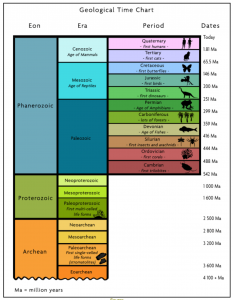 Starting in the late Paleozoic, more than 300 million years ago, and extending through Mesosoic (known as the Age of the Reptiles), the world’s great coal, oil and natural gas reserves were formed. In doing so, carbon dioxide was drawn down from the atmosphere over a period of tens of millions of years.
Starting in the late Paleozoic, more than 300 million years ago, and extending through Mesosoic (known as the Age of the Reptiles), the world’s great coal, oil and natural gas reserves were formed. In doing so, carbon dioxide was drawn down from the atmosphere over a period of tens of millions of years.
Today, we are turning back the clock by returning that carbon to the atmosphere in a matter of a few decades.
As I stated in last year’s address: elected leaders are at a pivotal moment in human history. We are responsible for deciding what path the future climate will take.
That is not something I say lightly. I feel the pressure of that responsibility in everything I do. It weighs heavily on me. But I know I am not alone in that and, while unpleasant, it’s also a good sign.
I can sense, for the first time in my career, that a change in the tide is coming.
In every challenge, there is opportunity. The greater the stakes, the higher the potential. British Columbians are eager for innovation and excited about building a sustainable economy.
Young people, in particular, have made this abundantly clear over the last year.
Millions of students, including many hundreds on the lawn of the legislature last Friday, are demanding elected officials protect their future.
You will die of old age, one sign read, I will die of climate change.
People are ready to support leaders who take climate action seriously.
Change is coming whether we like it or not, so let’s choose to be courageous.
To the opportunities I promised you earlier:
We are immensely fortunate to live in British Columbia. It is quite literally one of the best locations on the planet from which to navigate the climate related challenges ahead.
To start, BC has three strategic advantages over virtually every other region in the world.
- The quality of life and natural environment allows us to attract and retain some of the best and brightest minds from around the globe — we are a destination of choice.
- We have a highly skilled and educated workforce. Our high school students are consistently top ranked internationally. They are smart, well trained and they are ready to go to work. And we have exceptional post secondary institutions throughout our province.
- We have access to boundless renewable energy, fibre and water like no other jurisdiction in the world. We have incredible potential to create clean, renewable energy and forestry sectors to sustain our economy.
Transitioning to a carbon neutral world doesn’t mean going back to the dark ages. It means transitioning to a cleaner, sustainable society where economic, social and environmental concerns are central in all our decision making.
In fact, if we start right now, we stand a decent chance of transforming society without huge disruption.
What I am describing is not an impossible utopia. Every example listed is grounded in current economic trends, scientific evidence, and already established best practice.
We have so much to gain. It’s not just possible that the transition to a clean economy could create jobs. It is inevitable – Jobs that are inspired, important, and valuable. This shift can be the vehicle to deliver a more just, equitable, and healthy society.
To capitalize on these possibilities, we need to start planning beyond the next election cycle. We need to focus on building a new economy that works for all of us — not just the privileged few.
Policies must be based on principles and evidence, not political calculation and opportunism.
And as government leaders we must collectively do everything we can to develop policies that promote, rather than hinder innovation in or economy.
 Over the last two years, my team and I have been working with Minister Heyman to design CleanBC, our ambitious economic plan to build a thriving, climate-responsible and climate-resilient economy.
Over the last two years, my team and I have been working with Minister Heyman to design CleanBC, our ambitious economic plan to build a thriving, climate-responsible and climate-resilient economy.
With no silver-bullet solution to solving climate change, it is a collection of policies, incentives, targets, and regulations that will revive our economy and, if fully implemented, collectively achieve a 40% reduction in GHG emissions (from 2007 levels) by 2030.
It includes transitioning to 100% zero-emission vehicles by 2040, demanding far greater energy efficiency in both new and existing buildings, and investing significantly in training workers for a low-carbon economy.
Governments talk a lot about competitiveness, saying if we ask too much of companies they will leave.
But I have never understood why we want to be competing with other jurisdictions who are willing to sacrifice their clean air, land and water or willing to commit human rights abuses, all in order to see who can extract their resources cheaper and faster.
I believe government should be playing a more active role in supporting the type of economy we want to build. Not simply managing the one we have, ignoring the challenges on the horizon.
I don’t want to drag BC into a race to the bottom by subsidizing the tired, and dwindling industries from the last century.
I want to compete in an entirely different arena – for who can be the best, leanest, most efficient, with the healthiest, happiest citizens.
Thoughtfully designed policies can send signals to the market and spur innovation.
Many companies in BC are already leading the way within their sector.
At the tech summit earlier this year, I had the opportunity to moderate a panel with a number of inspiring companies who are pushing the envelope – creating high quality jobs and harnessing the power of innovation to help us respond to the climate crisis.
MineSense, for example, is one I talk about often because they epitomizes the type of approach I am talking about. Their real-time, sensor-based ore sorting technologies allow them to analyze a rock face and determine whether it is economical to ship it to the crusher, or if it should be put aside for fill.
Investing in innovation has made their process smarter, more efficient, and saved them money along with saving water.
They can export their product, but they have also been able to export the technology.
 Another inspiring BC company is General Fusion. General Fusion is a truly groundbreaking company, at the forefront of clean tech.
Another inspiring BC company is General Fusion. General Fusion is a truly groundbreaking company, at the forefront of clean tech.
Based in Burnaby, they are working towards commercializing affordable, abundant, safe and emission-free electricity from fusion energy. This company has the potential to transform the world through transforming our energy supply.
Carbon Engineering is a Canadian company that has developed innovative technology to create liquid fuels from atmospheric carbon dioxide, who set up shop in Squamish a few years ago.
Their potentially revolutionary technology also has the ability to capture and sequester human produced carbon dioxide directly from the atmosphere. A BC company that has become famous around the world.
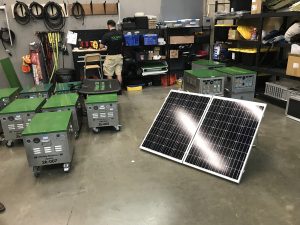 Then there are Portable Electric and Corvus Energy, two Vancouver-based success stories delivering mobile and marine electricity storage systems, respectively.
Then there are Portable Electric and Corvus Energy, two Vancouver-based success stories delivering mobile and marine electricity storage systems, respectively.
Portable electric’s battery power stations are a clean alternative to diesel generators are already being used to power everything from festivals to film sites.
And let’s not forget Unbuilders, a growing team of highly skilled tradespeople who have recognized opportunity in deconstruction.
Instead of demolishing old homes, they deconstruct them piece by piece and salvage vast quantities of historical old growth and other used building materials.
The sale of the residuals means it ends up costing less to deconstruct an old building than demolish it.
What an incredible example of innovation in the building sector. And it is all BC-based.
I could talk about my favorite BC-based, 21st Century companies all day, but noting the time, I’ll just mention one other.
Structurlam: What an amazing example of a thriving BC based business in the value-added forest sector.
 Their two main products Glulam and Crosslam are 100% engineered-wood laminations that are used as replacements in building construction for steel and cement, respectively.
Their two main products Glulam and Crosslam are 100% engineered-wood laminations that are used as replacements in building construction for steel and cement, respectively.
And they are committed to source lumber from BC-based companies like Kaleshnikoff Lumber Co. Ltd., a family owned business located in Tarry’s BC that was started in the late 1930’s by the children of Doukhobour immigrants who came to Canada in 1911.
These companies form the foundation of a strong, resilient, economy. Prosperity and jobs remain local as they they build on our strategic strengths ensuring that value added, technology and innovation are what we export.
Local governments, too, are already proving what is possible.
Last year, 50 local governments reported achieving carbon neutrality.
Last summer, the City of Surrey broke ground on the first community centre in North America to achieve Passive House certification.
In the District of Lillooet, community leaders implemented a plan to improve road safety for pedestrians and cyclists by expanding infrastructure and enhancing bike lanes.
Cities including Victoria, Vancouver, and Tofino are leading the way on taking action on single use plastics – a policy, the courts have made clear, that requires provincial leadership.
Paving the way for you to succeed is something I take very seriously.
I have been working with Minister Heyman on the Climate Change Accountability Act, to be tabled this fall, in the hopes that it, too, will bolster and support your ability to tackle this head on.
I look to you, as local leaders, to pick up the work I have started and make it better. Take in further, adapt it to the opportunities and needs in your community.
You know better than anyone how to be a champion for your constituents. I am asking you today, to be courageous, ambitious, and innovative.
Think further into the future and govern not just for your term, but for your children and grandchildren.
This is the moonshot of our generation.
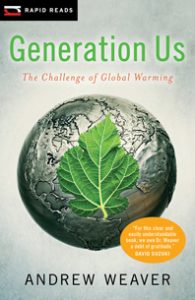 I’d like to end by reading the concluding paragraph of my book Generation Us: The Challenge of Global Warming that I wrote nearly a decade ago:
I’d like to end by reading the concluding paragraph of my book Generation Us: The Challenge of Global Warming that I wrote nearly a decade ago:
“Global warming has been branded an environmental problem. But it is really an economic and social problem. We’ve spent too much time living within a culture of global warming fear and denial. It’s time to recognize global warming for what it is: the most self-empowering issue we will ever face. Every consumer of energy is part of the problem. Every person is therefore part of the solution. We are entering an age of creativity and innovation unlike any that modern society has experienced before. Rather than fearing this change we need to embrace it. And the change starts in each and every one of our households. The time for Us is now.”
Thank you.
The Democracy & Me Art Contest is now open to all BC children & youth
The Legislative Assembly of British Columbia and the Lieutenant Governor of British Columbia have co-sponsored The Democracy & Me Art Contest.
 As noted in the contest poster to the right, it encourages K-12 students to create visual artwork that explores the importance of community and democracy.
As noted in the contest poster to the right, it encourages K-12 students to create visual artwork that explores the importance of community and democracy.
Contest winners will receive a trip to Victoria and their artwork will be displayed in the provincial Parliament Buildings.
Artwork must be submitted by January 31, 2020.
Please visit the The Democracy & Me Art Contest website for further details on how to submit your entry.
BC Green caucus celebrates equitable access to menstrual products for students
Great Victoria School District officially launched its initiative today to provide free access to menstrual products for students. Ensuring equitable access to menstrual products is an important issue long advocated for by groups like the United Way Period Promise campaign, and I am proud to have played a part in helping move this initiative along.
As you will see from my Question Period exchange the Minister of Social Development and Poverty Reduction:
“We all expect when we enter a public washroom that toilet paper is readily available and free. Why that isn’t the case for menstrual products is a very good question. One, I suspect, that if men had a menstrual cycle, we wouldn’t be asking today.“
Below I reproduce our media statement celebrating the BC Government and Victoria School District’s announcement.
Media Statement
BC Green caucus celebrates equitable access to menstrual products for students
For immediate release
September 5, 2019
VICTORIA, B.C. – Today the BC Green caucus is celebrating the official launch of the Greater Victoria School District’s initiative to provide free access to menstrual products for its students.
“Ensuring equitable access to menstrual products is an important issue long advocated for by groups like the United Way Period Promise campaign, and I am proud to have played a part in helping move this initiative along,” said B.C. Green Party Leader MLA Andrew Weaver.
In March, Weaver asked Minister of Social Development and Poverty Reduction, as well as the Minister of Education, how the upcoming poverty reduction strategy will ensure that all children and youth have equal access to menstrual products. One month later, government announced it would require all public schools in the province to provide free menstrual products in school washrooms.
“In a minority government, a key part of our role is to bring new ideas to the table, advocate for great ideas already out there, and work with government to inspire them to act. In this case, we are thrilled at the outcome,” Weaver said. “No student should feel restricted in their ability to participate in lessons or sports because they lack access to a basic need.
“Protecting children from harm -whether it be stigma or abuse- and advancing gender equity have been two areas in which the B.C. Green Caucus and B.C. NDP clearly agree. Making schools and society safer and more equitable for all of our children is a nonpartisan pursuit that unites British Columbians.”
A B.C. Green Caucus bill amending the Residential Tenancy Act garnered tripartisan support this May and passed with full votes from the NDP and Liberals. The bill provides renters who are victims of violence associated with their home, or whose children are victims of violence, to break their fixed term lease and seek safety.
Also in May, B.C. Greens, alongside stakeholders and LGBTQ2+ rights advocates, tabled legislation that would ban the abusive practice of conversion therapy.
“We hope government continues to show support for the children of British Columbia this fall by working with our caucus to ban so-called conversion therapy,” Weaver said.
-30-
Media contact
Macon L.C. McGinley | Press Secretary
B.C. Green Caucus
+1 250-882-6187 |macon.mcginley@leg.bc.ca
A renewed call for comprehensive protections against ‘conversion therapy’ in BC
Yesterday, a few days before the Pride Parade in Vancouver, the BC NDP government published an open letter to the Honourable David Lametti, federal Minister of Justice and Attorney General, calling on the federal government to amend the Criminal Code to ban the practice of conversion therapy. The letter specifically states that:
“Conversion therapy is hateful and harmful and therefore should be a crime in Canada.”
While obviously supportive of this call, the fact of the matter is that there is much we can do in British Columbia. I am troubled by what appears to be the government’s response to my introduction of a bill to ban this practice in British Columbia. Rather than taking steps to deal with this issue in a timely fashion, as has been done in other provinces, our government’s response is simply to kick the can down the road and blame the federal government.
Conversion therapy is an abusive, dangerous practice that must be banned to protect the safety and health of British Columbians — children and youth in particular. This is, fundamentally, an issue of human rights. Medical and scientific associations, including the American Psychiatric Association and the World Health Organization, condemn the practice, but it continues to this day and it continues to this day in British Columbia.
British Columbia is currently behind much of Canada. Ontario banned this practice provincially in 2015, as did Nova Scotia in 2018. While the BC Greens believe that this practice should not be happening anywhere in Canada, the federal government have already announced that they expect the provinces, not the federal government, to address it.
Ultimately this is why the BC Greens introduced our bill prohibiting the provision of conversion therapy treatment to minors and the payment or reimbursement of conversion therapy through health insurance or MSP. All British Columbians deserve to be loved, supported and accepted, not persecuted for who they are. And all British Columbians deserve their government to stand up for their interests and not simply pass the blame onto someone else.
Below I reproduce the media release my office issued in response to government’s open letter.
Media Release
B.C. Green Caucus calls for comprehensive protections against ‘conversion therapy’
For immediate release
August 1, 2019
VICTORIA, B.C. – The B.C. government’s response today regarding the dangerous, nonmedical practice of conversion therapy rightfully calls for the federal government to amend the Criminal Code to fully ban the practice nationally. It also highlights current regulations within B.C.’s health system preventing health professionals from offering the service and billing for it. However, the letter from the B.C. attorney general, minister of health and MLA for Vancouver-West End shies away from tackling the full scope of the issue.
“Preventing health officials from practicing conversion therapy is important, and we also know that the majority of medical and scientific associations, including the Canadian Psychological Association and World Health Organization, oppose conversion therapy,” said Dr. Andrew Weaver, leader of the B.C. Green party. “For those outliers in the medical community, it is essential that clear regulations are in place to prevent them from assaulting youth with this treatment.
“Unfortunately,” Weaver continues, “many people are exposed to this pseudo-scientific practice by non-medical professionals – faith leaders, youth organizations, and even so-called family support groups. By trying to fundamentally change a person’s sexual orientation or gender identity they risk inflicting harmful, long-lasting damage that puts lives at risk.”
In May, the B.C. Greens, alongside stakeholders and LGBTQ2+ rights advocates, tabled legislation to amend the Sexual Orientation and Gender Identity Protection Act and close this loophole to ban the abusive practice of conversion therapy and protect British Columbians.
“In addition to ensuring this abuse is banned from anyone in the medical field, the B.C. Green bill also seeks to protect children and youth from conversion therapy practiced by other adults in positions of trust or authority.
“Elected officials have a responsibility to support those with diverse sexualities, gender identities and expressions. We must send a clear message that it is OK to be who you are, that your elected officials and those in positions of power hear you and will act now to protect your human rights. The federal government has a responsibility to safeguard the human rights of everyone within its national borders. In the absence of that leadership, however, B.C. should not wait to protect the health and safety of our communities and our children.
“We welcome legislation from any party that will protect the human rights, health, and safety of LGBTQ2+ people by banning so-called conversion therapy in our province and hope the government will work with us to ensure any efforts to do so are comprehensive.”
-30-
Media contact
Macon McGinley, Press Secretary
B.C. Green Caucus
+1 250-882-6187 | macon.mcginley@leg.bc.ca

